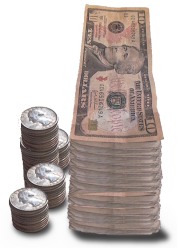
You
Need Savings
by Keith Rawlinson
Volunteer Budget Counselor
by Keith Rawlinson
Volunteer Budget Counselor
 |
You
Need Savings
by Keith Rawlinson Volunteer Budget Counselor |
|
...he who gathers money little by little makes it grow. Proverbs 13:11 |
| To
learn a lot more about saving, investing,
eliminating debt and
becoming wealthy, please read the articles
on the Financial Page.
There, you will find a veritable treasure of what to do and
how to do
it. |
 |